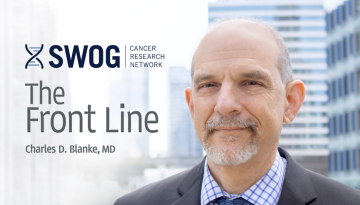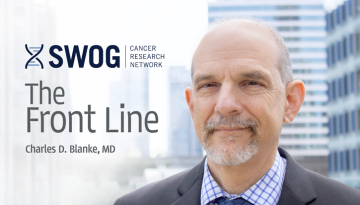Nurse Scientists & APPs: Their Growing Impact
Research nurses have always played key roles in the development and conduct of SWOG trials. In recent years, the scope of these roles has been expanding, and new guidelines released by NCORP have opened the options significantly further.
In September of last year, the NCI’s Divisions of Cancer Prevention (DCP) and Cancer Control and Population Sciences (DCCPS) issued guidelines allowing certain advanced practice providers, or APPs, to formally take on enhanced roles in the development and conduct of NCORP trials. These APPs are nurses with PhD, DNP, or master’s level preparation and with experience working in NCI-funded trials.
The new guidelines allow those who meet certain requirements to serve as chairs and co-chairs of NCORP-funded clinical studies and to serve as local investigators for purposes of consenting patients.
The guidelines also lift NCI restrictions on APPs prescribing non-investigational study drugs to patients on NCORP studies (of course, their prescription privileges may still be restricted by state licensing regulations).
This formal expansion of roles is a smart move on the part of DCP and DCCPS. First, it makes more efficient use of existing expertise and capacity within the network of sites that carry out NCI clinical trials. Second, it expands and diversifies the set of investigators who can enroll to studies, and having a larger pool qualified to enroll patients is likely to mean fewer potentially willing participants are lost to accrual. APPs are now enrolling, for instance, to S1703, S1714, S1820, and S1904.
Even before the publication of these NCORP guidelines, nurses within the SWOG Nursing Research Subcommittee, part of the ORP Committee, were expanding the range of support and expertise they provide, an expansion realized partly in response to encouragement by SWOG’s Vice Chair for NCORP Research Dawn Hershman, MD, MS.
Subcommittee members have widened their focus from providing support for patient-reported outcomes components of multiple studies to also, for example, serving as nurse coordinators of complex and unfamiliar assessments or behavioral interventions within trials.
An example of the former is the work Stephanie Smith, RN, MSN, OCN, performs as nurse coordinator managing the training for a neurosensory testing regimen that’s central to S1714’s assessment of taxane-induced peripheral neuropathy. An example of the latter is the role of Christa Braun-Inglis, MS, APRN, AOCNP, as nurse coordinator for S1820, helping to develop and conduct protocol training related to a behavioral intervention to manage symptoms in patients with rectal cancer. Braun-Inglis also serves as site PI for the Hawaii MU NCORP.
S1820 also provides strong evidence that nurse scientists are bringing great study concepts to the table. This randomized trial is chaired by Virginia Sun, PhD, RN, who is also co-chair on another concept now in development—S2016, a randomized phase 3 study of a palliative care intervention for patients with pancreatic cancer and the caregivers of those patients. Sun has been notably successful in getting supplemental funding for these trials, including R01 and R21 grants, not to mention a range of support from The Hope Foundation for Cancer Research. A number of other concepts proposed and led by nurse-scientists are in early stages of development.
At this spring’s Oishi Symposium, the Nursing Research Subcommittee presented on these new NCORP guidelines and on the roles and accomplishments of nurse-scientists and APPs within SWOG (a recording is available linked from the SWOG website). Subcommittee Chair Jamie Myers, PhD, RN, says the group is focused on supporting the role of APPs up to their full scope of practice within their licensure, institution, and state. The group has also made clear its desire to engage even more APPs and nurse scientists in the subcommittee’s work and in the development of new study concepts. And that can only be to the benefit of SWOG and our patients.
Other Recent Stories



